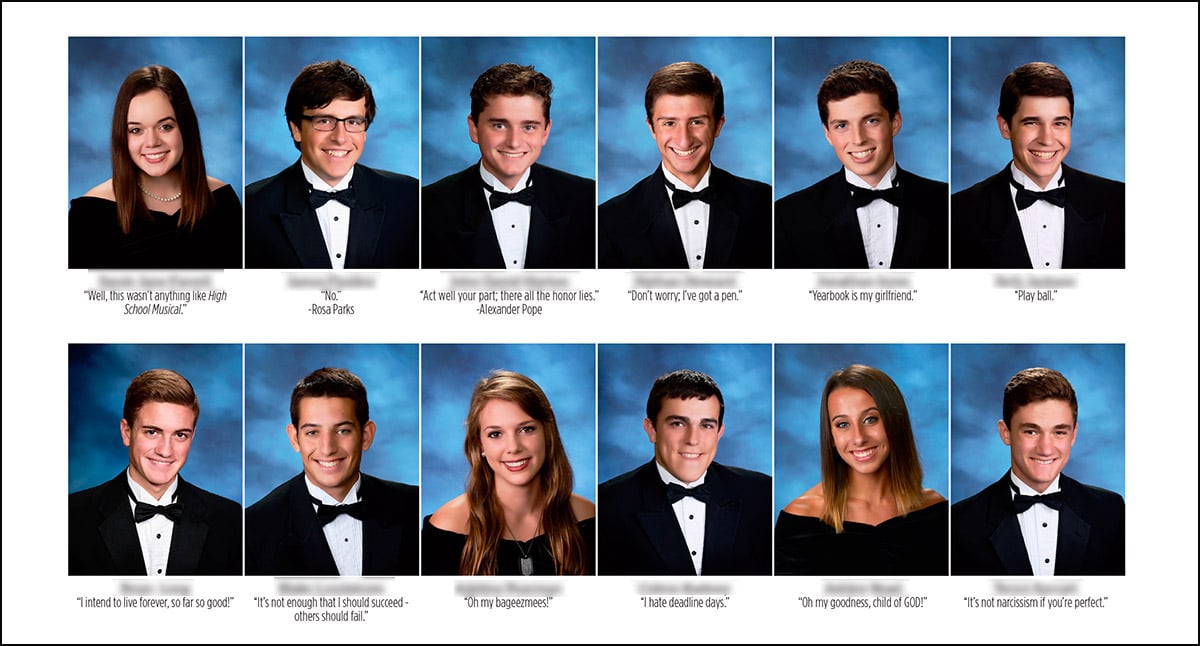
Every May, a host of Internet stories and social media posts gleefully delight in funny senior quotes. Occasionally, one of those quotes makes bigger headlines, embarrassing the yearbook staff and school. Senior quotes can be a source of contention and controversy, so should you run them?
The yearbook tradition of including a quote with a senior portrait is not without controversy. While the quotes are meant to be a reflection on the student’s personality or year, they often cause more harm than good.
Last spring alone, three high schools made the news after seniors chose quotes attributed to Nazis. Another staff trimmed out their senior portrait section after discovering inappropriate quotes before distribution; they replaced it with an insert without the quotes. At a fifth school, the adviser was relieved of duty as the yearbook club sponsor because of the senior quotes.
Senior quotes can be problematic because of the sneaky factor. A small portion of students will try to slip in inside jokes, sexual innuendo, drug references, offensive comments or other inappropriate submissions. Yearbook staffs spend valuable time checking quotes that are difficult to identify or verify.
If you’re thinking about ceasing senior quotes, we have a few suggestions to help you with the process:
- Have administrative support. Talk candidly with your principal about the challenges of verifying quotes, the copyright issues (see below), and the potential problems. It’s imperative you have support when changing a long-held tradition.
2. Have an alternative. Replacing the quotes with an element of equal value will make the transition less difficult. Consider featuring quotes from seniors in a different format and location. For example, have seniors answer four or five questions related to their senior year. This gives you numerous options to choose from and minimizes the chance of an inappropriate response. The quotes could run in sidebars instead of individually underneath pictures. (This also resolves the problem of empty spaces under seniors who didn’t provide a senior quote.)
3. Be upfront with the change, but smart with the explanation. How you phrase the change can lessen the negative response. Avoid saying “We’re no longer doing senior quotes.” Let students know you’re trying a fresh approach to include more seniors and focus closer on senior year and the high school experience.
4. Know there may be backlash. If senior quotes are a storied tradition in your school, it can be incredibly difficult to omit them. The outcry can be massive, especially if students have been looking forward to the tradition for years. (This is another reason it’s important administration is aware of the change and supports it.) Advisers who have endured the change say the first year is the most challenging; the second year there are less complaints and by the third year there is little to no commentary.
Even when the quotes are not a long-held tradition, the outrage can be overwhelming. One Texas adviser introduced the tradition at her school, only to stop after two years when it became too difficult to verify the submissions. She was deluged with angry calls, emails and visits from students and parents, despite the quotes have only been a recent tradition. She stuck to her guns though. Now, when asked about senior quotes, she directs people to the yearbook staff policy web page; it includes a list of reasons why they’ve gone in a different direction.
Klein Collins High School does a twist on senior quotes. They create a showstopper spread with beautiful portraits and the senior quotes run in a nearby text box. This makes the verification process easier and avoids the missing holes underneath portraits without quotes.
Eliminating senior quotes is not an easy decision. The outcry can be massive and a battle you may not want to endure. If you’re not up for the policy change, it’s essential to diligently verify and check quotes. A few small changes can make the process easier and less worrisome. Here are a few recommendations:
- Have multiple people proofread quotes, including editors, advisers and administrators. You need young eyes to catch newer phrases and jokes. It’s also helpful to have a principal oversee the quotes to make sure you didn’t miss any questionable submissions.
2. Encourage students to only submit original quotes. Quotes from TV, books, songs and movies are copyrighted and should not be used (The exception would be material published before 1924 which is now in the public domain.) Quotes from speeches and celebrities tend to not be copyrighted unless they were written down. But we still discourage you from using a celebrity or famous person’s quote. Really, what does Beyonce or Robin Williams have to do with your senior year anyway?
3. Use the internet to check all quotes. Every quote should be thoroughly checked numerous times. Search the internet to minimize unoriginal quotes and inappropriate ones.
Even talking about senior quotes can ignite fear and concern for advisers. While most quotes are innocuous, those few sneaky ones can jeopardize job security and the integrity of the book. The last thing any of us wants is to be the lead story on the nightly news.


